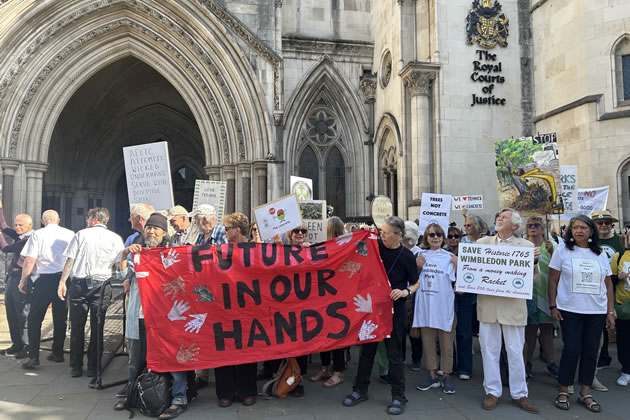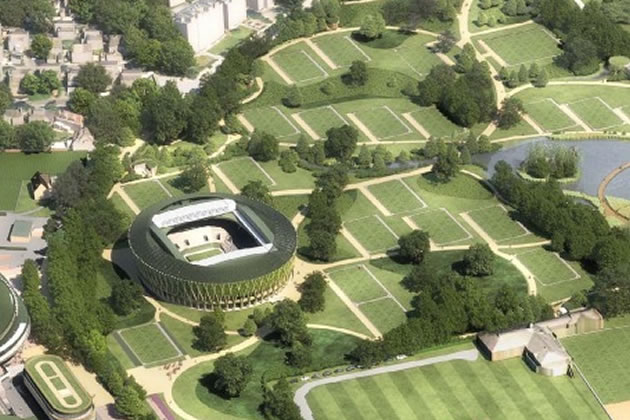Wimbledon Park Campaigners Vow to Fight On
Deliberations begin on legality of AELTC's development plan

Protestors outside the court ahead of the verdict
Campaigners have vowed to keep fighting after a judge backed planning permission to expand the home of Wimbledon tennis.
The Greater London Authority (GLA) approved plans last September for the All England Lawn Tennis Club (AELTC), which runs the Wimbledon Championships, to build 38 tennis courts and an 8,000-seater stadium on the former Wimbledon Park Golf Club, nearly tripling its site.
Mr Justice Saini dismissed Save Wimbledon Park (SWP)'s claim that the GLA's approval of the scheme was unlawful on Monday (21 July ), after the group brought a judicial review against the decision. The judge ruled the GLA made its decision rationally, and did not make any legal error in its interpretation of planning policy.
SWP confirmed it has lodged an appeal against the ruling, as it believes the GLA's decision was made unlawfully as it failed to properly take into account key redevelopment restrictions on the land. The GLA and AELTC dispute that the restrictions exist, and argue the decision to approve the project was fully rational.
Christopher Coombe, Director of SWP, told the Local Democracy Reporting Service (LDRS) that while the group was "obviously disappointed, there's a long way to go" in its fight against the plans as legal action continues. He warned the judgement, if it stands, would set a "worrying precedent for the unwanted development of protected green belt and public open spaces around London and across the country".
Mr Coombe told the LDRS, "If it goes ahead, it spells real threat to so much green belt and open space all around London, and around the country, because the protections are enormous for this kind of open space, and the GLA has driven a coach and horses through that so far."
He added, "Our supporters have been just amazing and there's a huge volume of support with everybody involved, which AELTC have really ignored which is sad."
Mr Coombe added SWP continued to hope AELTC would engage constructively with members, "with a view to achieving a resolution of this four-year-old dispute".
AELTC has owned the freehold of the site since 1993, which it leased to Wimbledon Park Golf Club until 2018. It wants to build the courts on the former golf course opposite its existing site on Church Road, nearly tripling its footprint, so qualifying matches for the world-famous tournament can be played there.
The private members' club argues the development will open up land that has been inaccessible to the public for more than 100 years, including through the creation of a new 23-acre public park. It says the development will "secure the future of the Championships" and create "year-round benefits for the local community".
AELTC submitted a planning application for the project to Merton and Wandsworth councils in 2018, as the site straddles the boroughs. It was refused by Wandsworth but approved by Merton in 2023. The case was then considered by the GLA, which approved it last September.

CGI of the aerial view of the completed scheme. Picture: AELTC
Jules Pipe, the GLA's Deputy Mayor for Planning, said at the time the project would "bring significant benefits to the local area, the wider capital and the UK economy, providing increased access to open green space and sport, new parkland and a host of new jobs".
SWP has fiercely opposed the plans and attracted widespread support, with dozens of campaigners rallying outside the High Court at the beginning of the judicial review on 8 July. Sasha White QC, representing SWP, told the court at the review that "you could not have a more protected piece of land in London".
He said the site was Metropolitan Open Land (MOL), which had the same protections as green belt, while it was Grade II* listed and protected from redevelopment by restrictive covenants. He added all trees on the site were protected by preservation orders and that it fell in the Wimbledon North Conservation Area.
Mr White argued the GLA made its decision unlawfully by failing to properly consider the implications of the restrictive covenants and a statutory trust he claimed the land was subject to – requiring it to be kept available for public recreation – on the proposals.
However, upholding the GLA's decision today, Mr Justice Saini said: "In short, the defendant's decision on the relevance of deliverability (applying to both the statutory trust and the restrictive covenants) was a planning judgment rationally exercised and having regard to appropriate and relevant factors."
A separate court case is due to be heard in January over whether the land is protected by a statutory public recreation trust. AELTC maintains there has never been such a statutory trust affecting the land.
Charlotte Lilywhite - Local Democracy Reporter